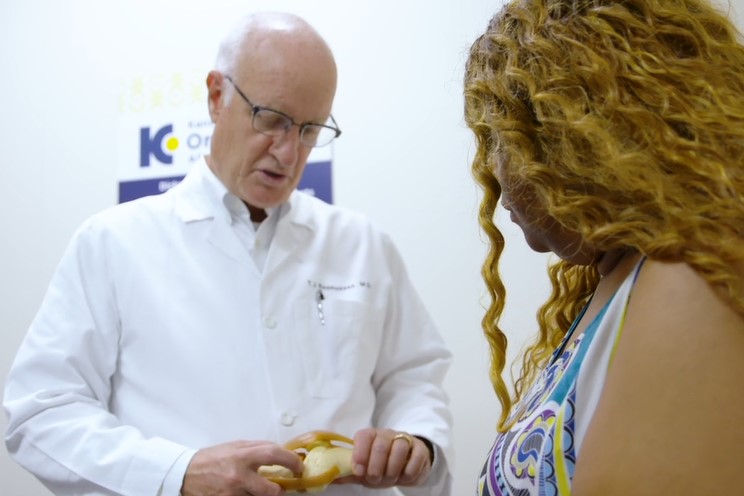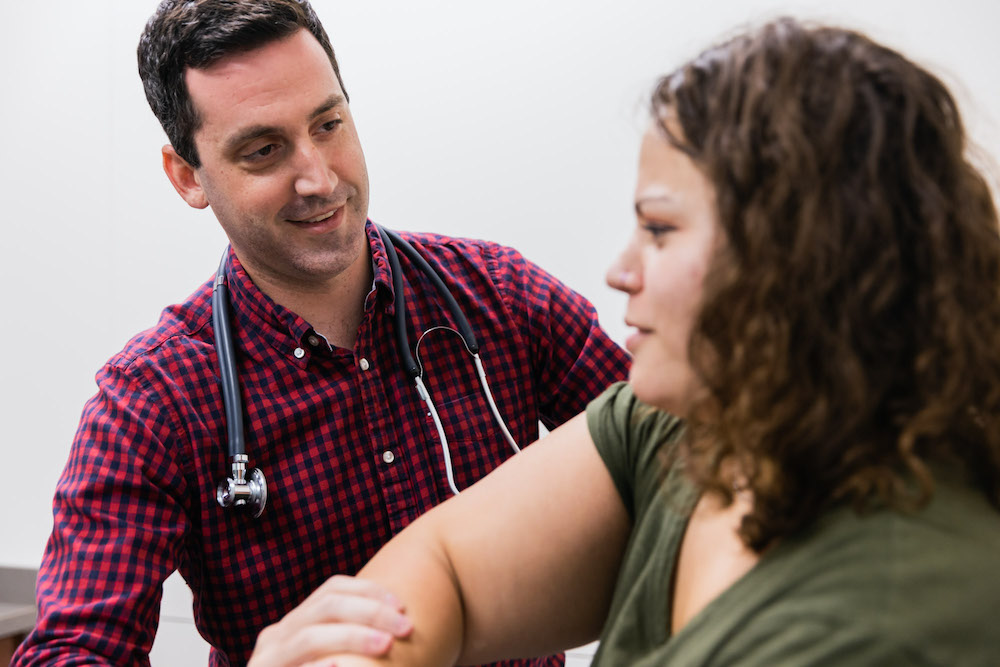
Does your athlete go from one sport to the next all year long? There are physical and psychological benefits to playing multiple sports; however, preventative measures must be in place to keep your athlete healthy through the seasons.
At Kansas City Orthopedic Alliance, our sports medicine physicians have years of experience treating sports injuries. From the big times to the little leagues, we aim to get players back in the game as quickly and safely as possible.
With 6 locations across the metro, KCOA is the largest orthopedic practice in Kansas City. Our providers work with professional athletes, collegiate athletes, high schoolers, middle schoolers, and everyone in between.
In this blog, we’ll discuss the risks and benefits of playing multiple sports, tips for keeping your athlete healthy, and what you should do when injury occurs.
If you need treatment for a musculoskeletal injury right now, contact a sports injury specialist in Kansas City.
The research on participating in multiple sports
Many parents think that narrowing sports focus at a young age will lead to better athletic outcomes. However, a lot of research shows the opposite to be true.
The American Academy of Pediatrics cautions that sport specialization at an early age can lead to negative physical and psychological effects, including burnout, overuse injuries, and social isolation. Because of this, they recommend children wait until late adolescence before specializing in a single sport.
A study published in the American Journal of Sports Medicine compared NBA players who participated in multiple high school sports to single-sport athletes. There were three significant findings in this study:
- Multi-sport athletes were less likely to sustain a major injury during their career
- Multi-sport athletes played in a greater percentage of total NBA games
- Multi-sport athletes had increased longevity in the NBA
Overall, this study found that NBA players who were multi-sport athletes in high school were actually more successful in their athletic careers.
Some of the best professional and collegiate athletes played multiple sports throughout childhood. The following reasons might explain why:
- Athletes have fewer overuse injuries when their activities are varied
- Cross-training is beneficial for strengthening different muscle groups
- Athletes who play several sports are less likely to experience burnout from one sport
- Players on multiple teams learn to work with different teammates and coaching styles
Negative physical and psychological impacts
While there are many benefits to being a multi-sport athlete, you need to take precautions to ensure your athlete stays healthy throughout the seasons. When athletes are overworked, over-stressed, and over-trained, their mental and physical health suffers.
Look out for these signs in your athlete:
- constant fatigue
- chronic muscle soreness
- increased injuries
- weakened immune system (increased illness)
- burnout in the sport
If your athlete is experiencing any of the above symptoms, it might be time to take some time off and if necessary, seek guidance from a sports medicine provider.
How to keep your multi-sport athlete healthy
To keep your athlete healthy, you must be proactive about injury prevention. Follow these tips to keep your athlete in tip-top shape this year.

Make time for rest
Don’t underestimate the importance of rest. Although it’s easy to overlook, the body needs time to relax and heal, especially when activity levels are high. Going from one season to the next year-round only increases the risk of injury. Make sure your player is taking an off-season to rest.
This is especially important for athletes who sustain injuries during the season. Injuries that initially seem minor only get worse when they don’t have time to heal. Sports medicine providers at KCOA can help you determine when it’s safe to return to play.
Play one sport per season
Doubling up on sports in one season can quickly wear down the body and lead to injuries. Instead, encourage your athlete to choose one sport per season to allow for physical and mental breaks.
Plan ahead for transitions
When going from one season into the next, plan for the transition. For example, if your athlete hasn’t thrown a baseball in 6 months, slowly warm up those muscles by throwing a few pitches per night. Jumping into the first practice cold only increases their risk of injury.
If they’re coming straight off another season, intensive training during this transition period is not necessary. Allow your athlete time to rest, but slowly prepare their bodies and skills for the upcoming sport.
Ensure proper nutrition and hydration
Good nutrition is important for everyone. Athletes must fuel their bodies with foods that give them the energy to get through long days of school and practice. Help your athlete choose a balanced diet of fruit, vegetables, protein, and whole grains.
Hydration is essential for performance, injury prevention, and recovery. Young athletes need to drink water throughout the day. This becomes especially important when transitioning to summer sports. With the increase in heat and activity levels, ensure your athlete has a water bottle with them throughout the day.
Get the right gear
Gear is one of the best ways to keep athletes safe during practices and games. Make sure your equipment fits properly and is worn correctly. This applies to equipment like helmets, masks, and guards, but it also applies to supportive gear (like tennis shoes). The right equipment can help protect your child from serious injury.
Related: An Orthopedic Sports Physician’s Back to School Tips for Young Athletes
Sports injuries
Unfortunately, injuries are going to happen. When they do, it is crucial to seek treatment for the injury before returning to play. At KCOA’s sports injury clinic in Merriam, our team of highly qualified providers can help you return from injury even stronger than you were before.
Common sports injuries
Some of the most common injuries our sports medicine physicians treat include:
- Shin splints
- Stress fractures
- Plantar fasciitis
- Tendonitis
- Shoulder, hip, knee, ankle, or elbow bursitis
- Meniscus tears
- Sprains, strains, and tears
- Tennis elbow
- Turf toe
- Torn rotator cuffs
- ACL tears
- Leg & knee fractures
- Groin pulls
- Hamstring pulls
- Achilles tendon injuries
KCOA is proud to be among the best sports medicine providers in the Midwest. Using the latest technology, our experienced providers can evaluate, diagnose, and treat nearly any type of musculoskeletal injury.
Common treatments
At one of our 5 locations (Overland Park, Leawood, Belton, Kansas City, and Blue Springs), we will complete an evaluation, physical exam, and diagnostic testing to determine the best treatment for your needs.
Our sports injury specialists often combine treatments for the best outcomes, which can include the following:
Physical therapy
Movement plays an important role in the body’s healing process. Physical therapy can help improve your range of motion, decrease pain, and increase strength and flexibility. Many patients can greatly improve their injuries with exercises guided by a qualified physical therapist.
Prescription medications
Depending on your injury, your physician might prescribe medications to reduce pain and inflammation. Your doctor may also recommend over-the-counter medications to help you recover and heal.
Injections for pain
Sometimes, injecting a steroid, hyaluronic acid, or other medication into or near the affected area can help with pain. Our physicians use ultrasound to guide injections and ensure maximum effectiveness.
Stem cell and PRP treatments
For younger patients with mild to moderate injuries, stem cell injections or platelet-rich plasma may be used for painful injuries. KCOA’s orthobiologics team uses cutting-edge technology to give patients long-term pain relief.
Orthopedic surgery
In most cases, we always start with conservative treatments for your injury. If all non-surgical options are exhausted and you are still experiencing pain and/or limited function, we will start discussing surgical treatments. Our providers will thoroughly guide you through the options and help you make the right decision for you.
Want to learn more about KCOA? Hear from Dr. Brit Moore, a nonoperative sports medicine and musculoskeletal medicine specialist, talk about why KCOA should be your choice for sports medicine treatments.
When you need a sports injury specialist in Kansas City, Kansas City Orthopedic Alliance has you covered.
At Kansas City Orthopedic Alliance, we make it our mission to create a superior patient experience for all. Regardless of the location or severity of your athlete’s injury, our team will work with you to ensure the best possible outcome.
We have 6 convenient locations throughout the Kansas City area—Overland Park, Merriam, Leawood, Belton, Kansas City, and Blue Springs. Find the nearest clinic.
For a thorough evaluation, call us at (913) 319-7600 or schedule an appointment today. If your athlete is experiencing pain and you don’t know where to start, use our symptom tracker to get treatment recommendations from a bone specialist in Merriam.


